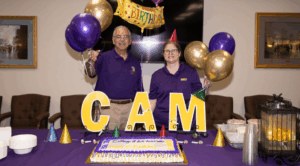Alumna Spotlight: Elisabetha Guelker ’70
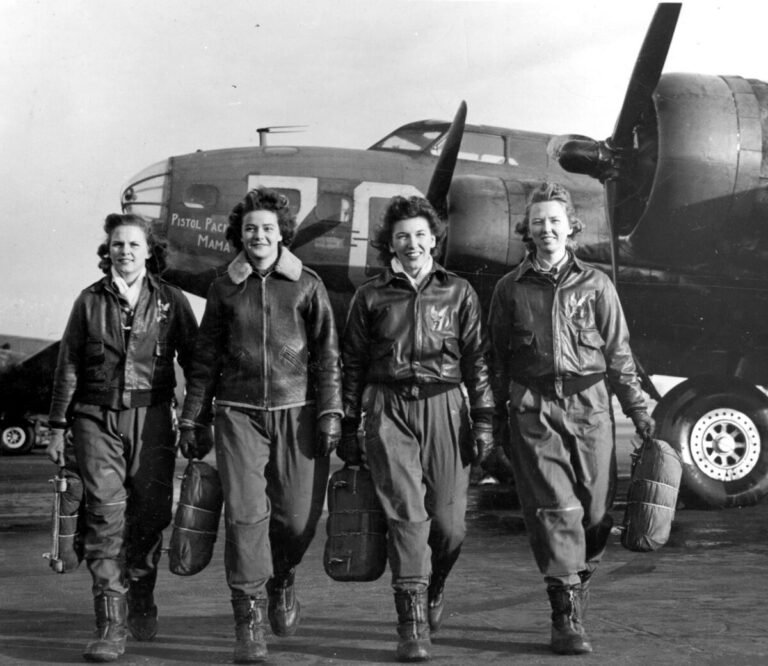
The story of Mrs. Elisabetha Guelker ’70 is a story of breaking barriers and perseverance. Ninety-three years young, Elisabetha is a first-generation American born in Lancaster, Pennsylvania. Her parents entered the United States, by way of Canada, after a harrowing escape from communist Russia. In Russia, Elisabetha’s mother refused to denounce her faith and pledge allegiance to the Communist Party. After losing her job as a teacher and witnessing her family and friends executed, she fled her homeland by way of Siberia and Finland, before finding refuge in Germany.
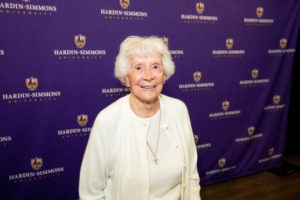
Elisabetha Guelker ’70
Elisabetha’s father, a member of the White Army in Russia, was fighting against communist control when, the sole survivor of an explosion, he was luckily mistaken for a German Prisoner of War (POW). He was taken back to the POW camp, healed from his injuries, and benefited from the repatriation of German prisoners under the Bolshevik regime. Had he not been mistaken for a German POW, he most likely would have been sentenced to death.
Elisabetha’s parents serendipitously met in Munich, married, immigrated to the United States, and raised their family.
In the household, the family spoke German, Russian, French, and Old Germanic, leaving young Elisabetha to learn English from her older brothers. “My oldest brother went to school first and would teach my other brother and I English at the table,” she shared. Their home was located across the street from the local school. “I would play with the school kids when they were at recess and would then follow the class inside to hear the lessons. My mother would come looking for me and after a few times, the principal agreed to let me stay. He thought I would get bored and go home. But, I always loved school,” she said with a smile. Elisabetha sat through the first grade two separate times by following her brothers in from recess. When she was old enough to officially attend school, Elisabetha skipped a grade because she already knew the material.
The love for learning continued throughout Elisabetha’s life. She attended secretarial school after high school and spent time working as a secretary. Of the office conditions, Elisabetha shared, “There were no windows and no sunlight while working those long days. I developed anemia due to not being exposed to sunlight, and eventually stopped working there due to health reasons.” On a respite from work, healing, and absorbing Vitamin-D, Elisabetha decided to enlist in the newly created Women’s Air Force (WAF).
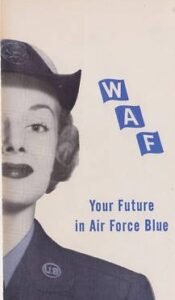
WAF poster
Elisabetha was always inspired by the Women Airforce Service Pilots (WASP) of WWII, so the decision to join the WAF was an easy one for her. What was not easy, though, were the number of barriers she had to overcome because of her gender.
Elisabetha enlisted while living in Saint Paul, Minnesota, and was quickly sent to Kelly Field in San Antonio, Texas for basic training. It was here she faced her first hurdle. Elisabetha wanted to be a radio operator. She fought to have access to the same tests her male counterparts were automatically granted, saying, “They didn’t think I could do it and would not offer me the radio operator test. I had to say I was just as entitled to take the test as anyone else.”
“I passed the test with flying colors,” she said. Elisabetha went on the share about the test, “We were tested on Morse code. Now every Boy Scout knew Morse code. I, however, had piano training when I was younger, so I noticed the letters sounded like [Elisabetha then hummed what an “a” in Morse code sounded like] musical tones.” For the test, Elisabetha had to listen to a string of Morse code, and anytime the letter “a” was used, she had to make a note. Her ability to associate “a” with a musical tone helped her to pass the test.
While in basic training, Elisabetha traveled to Washington, D.C. to march in President Truman’s second inauguration parade. She was part of the first all-female squadron to march in a presidential inauguration. Of the day, Elisabetha shared, “Now you talk about cold! The men wore their normal uniforms and were able to layer with long johns underneath, but the women didn’t have that luxury. We marched in skirts and high heels.” Another first for the day, Elisabetha shared, “I stood next to General Eisenhower.”
Elisabetha was next sent to radio operator school at Keesler AFB. “I was the only woman in my unit,” she said. “Any other women on base, part of WAF like me, stayed in the nurses’ quarters.” Elisabetha had to report for roll call first thing in the morning, just like her male counterparts. “The first time I stood for roll call, they didn’t expect to see me, and I was asked what I was doing here. And I said, I was here for radio operator school. Well, the men fell in, only wearing shorts. The next time they were dressed.”
“I graduated third in the class,” Elisabetha proudly said.
Elisabetha believes she was the first female radio operator in the Air Force.
After graduating, Elisabetha went to various bases across the country, where she served on the flight line. She decoded messages, recorded responses, transferred messages into code, and more.
One night after a 10-hour shift, Elisabetha met a young Army engineer in the mess hall. “He took my tray for me, opened the door, and escorted me across the base to my quarters.” After a movie date, the rest was history. Elisabetha married Ervin Guelker, known as Tex, in the base chapel in 1950. In 1951, Elisabetha was honorably discharged after three years of service. “I loved my time in the Air Force. In those years, they didn’t want pregnant women in the military. So, once a woman became pregnant, she was honorably discharged,” shared Elisabetha.
Elisabetha and Ervin moved to Sweetwater, Texas, where they raised two sons. Sadly, tragedy struck, making Elisabetha a young widow in 1960. Over the years, she worked various jobs, and eventually settled in with Sweetwater ISD as a teacher’s aide.
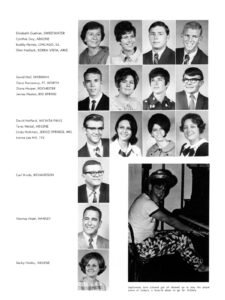
1970 Bronco
Wanting more, Elisabetha enrolled with Hardin-Simmons University and graduated in just three years with a Bachelor of Science in physical and health education. She has fond memories of her time as a student, “Everyone was so kind when I was a student. The students here never made me feel out of place for being older than them.” Elisabetha also gives kudos to her children, “My boys made it possible for me to commute to Abilene. They took care of their schoolwork, and even had dinner waiting for me some nights.”
One memory includes Elisabetha teaching an HSU professor how to swim. “I won’t tell you her name, I don’t want to get her in trouble,” said Elisabetha with a laugh, “but I always found it odd that she never got in the pool with us during swim class. So, I spoke to her about it and it turns out she couldn’t swim! I would stay behind after class and quickly taught her how to swim.”
A point of pride was a research paper she presented to Dr. Rupert Richardson ’12. “He asked to keep a copy of my findings for his collection,” she said.
After graduating from HSU in 1970, Elisabetha taught and coached for Sweetwater ISD for 25 years. She also drove the school bus.
At present, she is looking forward to traveling with the Traveling Range Riders in June and is most excited to see the Oberammergau Passion Play. A German speaker, herself, “I can’t wait to hear the Passion in German,” Elisabetha said.
When asked what advice she has for current HSU students, Elisabetha said, “The more you study, the more you’ll love it.” A lifelong student herself, students should take her advice!
Thank you for your service and stories, Elisabetha! HSU is happy you’re a part of the family.
